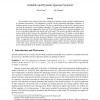Free Online Productivity Tools
i2Speak
i2Symbol
i2OCR
iTex2Img
iWeb2Print
iWeb2Shot
i2Type
iPdf2Split
iPdf2Merge
i2Bopomofo
i2Arabic
i2Style
i2Image
i2PDF
iLatex2Rtf
Sci2ools
135
click to vote
PODC
2003
ACM
2003
ACM
Scalable and dynamic quorum systems
We investigate issues related to the probe complexity of quorum systems and their implementation in a dynamic environment. Our contribution is twofold. The first regards the algorithmic complexity of finding a quorum in case of random failures. We show a tradeoff between the load of a quorum system and its probe complexity for non adaptive algorithms. We analyze the algorithmic probe complexity of the Paths quorum system suggested by Naor and Wool in [28], and present two optimal algorithms. The first is a non adaptive algorithm that matches our lower bound. The second is an adaptive algorithm with a probe complexity that is linear in the cardinality of the smallest quorum set. We supply a constant degree network in which these algorithms could be executed efficiently. Thus the Paths quorum system is shown to have good balance between many measures of quality. Our second contribution is presenting Dynamic Paths - a suggestion for a dynamic and scalable quorum system, which can ope...
Related Content
| Added | 05 Jul 2010 |
| Updated | 05 Jul 2010 |
| Type | Conference |
| Year | 2003 |
| Where | PODC |
| Authors | Moni Naor, Udi Wieder |
Comments (0)

